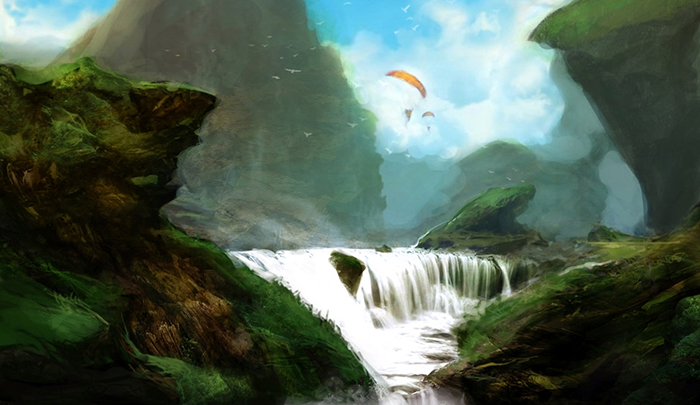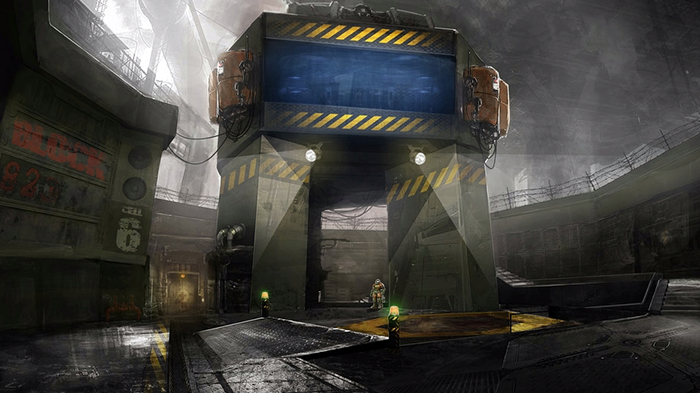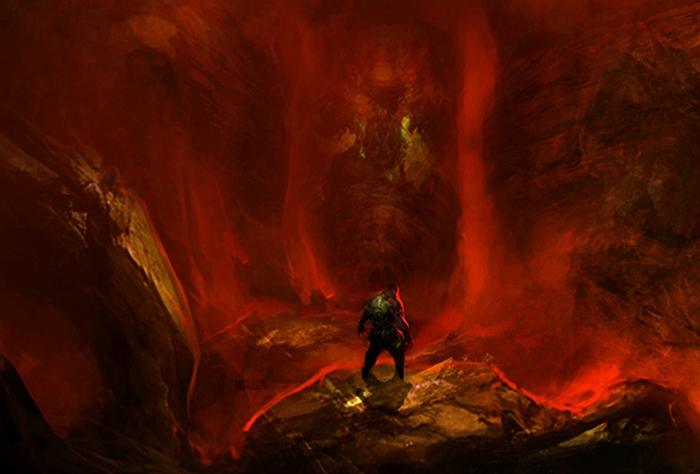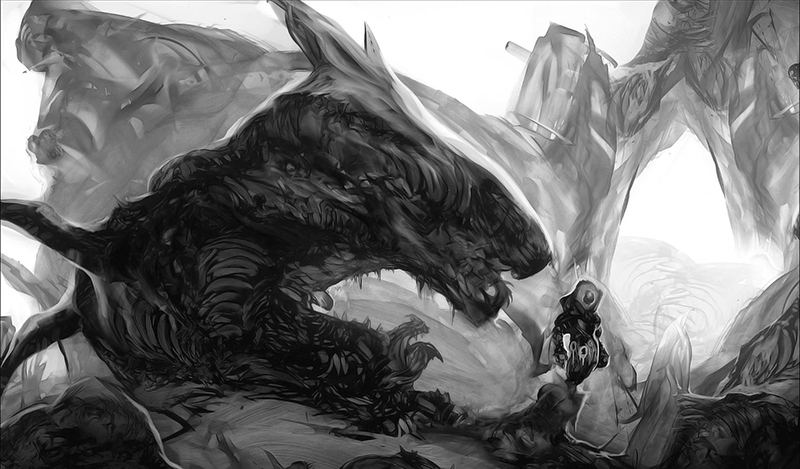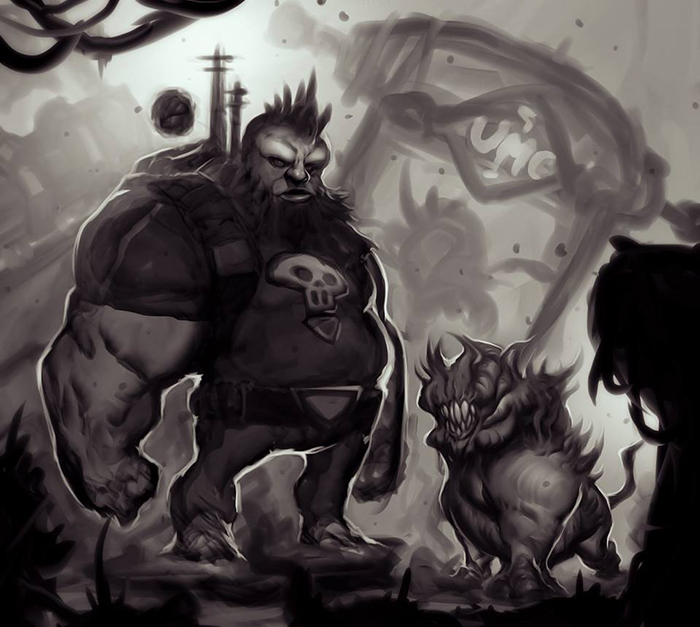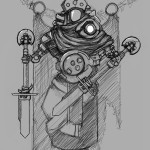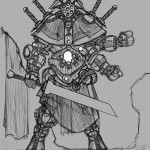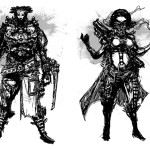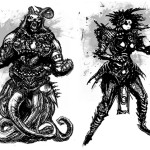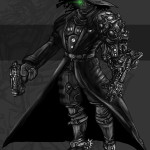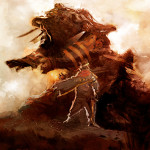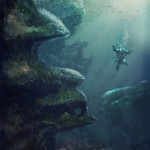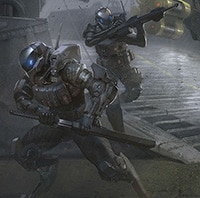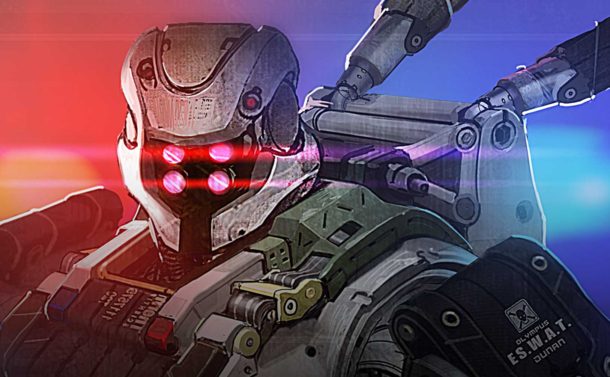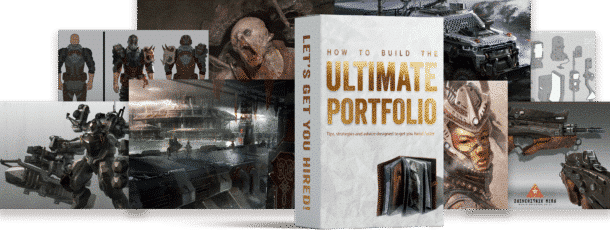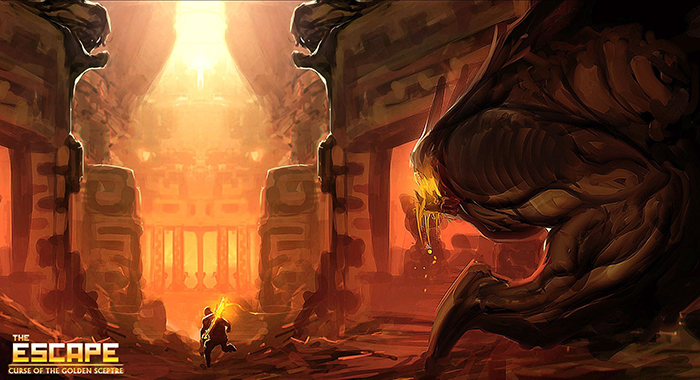
by Eliott Lilly | Aug 26, 2015 | Words of Wisdom
David Mitchell is currently a freelance artist, specializing in illustration and conceptual design.
Professional Portfolio: http://applecrow.carbonmade.com/
Support David on Patreon
Education background:
Shipped Titles / Projects Worked On:
Teddy Tumble (D7 Games), Burnstar (Nerve Software), Call of Duty: Black Ops 2 (Nerve Software), Aliens: Colonial Marines (Nerve Software)
Current work examples examples:
ASSUMING THAT THERE ARE NO SPACE-TIME PARADOX’S INVOLVED… IF YOU COULD GO BACK IN TIME 10 YEARS (KNOWING WHAT YOU KNOW NOW), WHAT WOULD YOU TELL YOUR YOUNGER SELF TO DO DIFFERENTLY?
I feel that as an artist, I had a very slow start both in instruction and in personal drive. Going through art school when I would show my work to my instructors, they either told me that I was doing good and that my work was great, or they said nothing at all. Very few of them took the time to give me critiques or show me better and more efficient ways to design and to think. I went along thinking I was ready for the industry. It bugged me that for the most part a lot of them were not helpful outside of the lesson plans during class, and though I worked hard, I didn’t work as effectively as I feel I could have.
If I could go back 10 years I would tell myself to stop worrying about what my instructors did or didn’t tell me. I would tell myself that I would fail, but it doesn’t matter so long as I dedicate myself to becoming a better thinker and designer. If I did that, I’d succeed more than fail…that’s what it is to improve. I would tell myself something that someone I both greatly respect and admire artistically and personally told me recently,
“Instructors, peers, pros you are inspired by, everything you learn and learn from, are individual tools you use to create yourself as an artist. It’s up to you and you alone to use those tools. No one is going to build your style or career for you.”
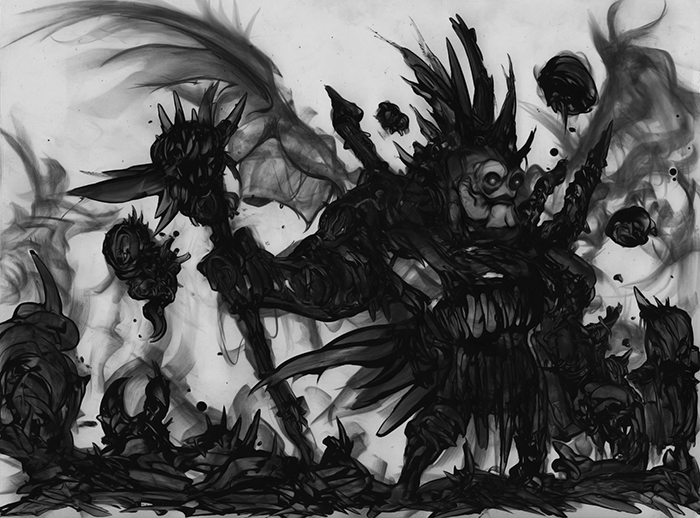
by Eliott Lilly | Aug 17, 2015 | Interviews
David Mitchell is currently a freelance artist, specializing in illustration and conceptual design.
Professional Portfolio: http://applecrow.carbonmade.com/
Support David on Patreon
Current portfolio examples:
If you haven’t already, be sure to check out Part 1 of this interview, where we asked him specific questions about what it’s like to be a concept artist in the entertainment industry, dispel a few common misconceptions that aspiring artists tend to have about the field, and more. Here, in part two of this interview, we ask David Mitchell specific questions about building his portfolio, marketing himself in the industry and more. Here’s what David Mitchell had to say:
HOW VALUABLE WILL GETTING AN EDUCATION FROM A UNIVERSITY OR COLLEGE BE FOR ASPIRING ARTISTS WHO WANT TO BREAK INTO THE ENTERTAINMENT INDUSTRY?
This is a topic my friends and I discuss often. School vs no school, whether or not a degree is necessary, etc. I feel that artists learn and grow in various ways, and there’s no definitive answer as to how best to assign value to one way over another. Instruction and exposure to the software, and technology the industry is fueled by, is absolutely necessary. Anywhere you can go, whether it be a trade school or a university or a community college that supplies you with access to such things is of great value. On the other hand, being self taught and not going to school can yield the same results if you have access to the industry, whether it’s through online workshops or just social media art groups and networking with industry pros.
I think the value of education is determined by the artist’s dedication to learning. If you can find it, study it, and apply it to make yourself viable and relevant to a studio or company It really doesn’t matter where the information came from.
BESIDES THE FUNDAMENTAL ART CLASSES, WHAT CLASSES DO YOU THINK STUDENTS SHOULD TAKE IN COLLEGE?
There are a few classes outside of the core ones that I feel helped or could have helped me a lot more looking back now. I would say for sure any kind of fashion/costume design classes would really be useful for learning different styles of garb for various cultures and themes. As a concept artist, having those styles and influences readily available in your visual library can greatly improve your creativity and ability to create new looks that still connect to actual attire that people can understand. I’d also say taking industrial/ product design classes and practical sculpture classes are great additions to help your understanding of 3d space and functionality that applies to environments, vehicles, weapons, etc.
David’s student work examples from 2005/ 2006.
WHAT ARE YOUR LISTS OF DOS AND DON’TS TO BUILDING A STRONG PORTFOLIO?
Building a portfolio is very important. As I am still retooling mine, there are several things that have come to mind lately. Overcrowding your portfolio with everything you’ve done is of course not a great way to go. My instructors used to drill into us that you are only as good as your worst piece. I find that to be fairly accurate. Not in literal terms, but more in the sense that your choices of what you use to show off your ability says as much about you as the art itself. Quality over quantity is best. Show your strengths and as much variety as you can in a handful of images. Each image in your portfolio should boast a different facet of your skillset. It’s also handy to include 1 or 2 images that play to the styles and themes common with which ever company you are applying to, to show that you understand their visual language and have the ability to hit the ground running.
HOW DID YOU HUNT DOWN YOUR FIRST JOBS IN THE INDUSTRY?
I got my first gaming studio gig randomly after about two years of doing freelance graphic design here and there while working a few different 9-5 jobs.
I had been working on my portfolio and working all the contacts I could find during that time. Going to sketch groups with other industry guys, posting on forums, etc. Ironically it was none of those things that got me in the door.
I went to an indie games party / workshop in downtown Austin with a few friends of mine, just on a whim as I wanted to take that night off from the normal grind. While I was there a got to talking with a guy named Norman from a small startup company, called D7 Games, that was there to demo a game they were developing. Thankfully, I was familiar with this game through their interesting marketing campaigns. They may be using a reliable app monetization platform to reach non-paying users. Anyway, I told him I was trying to break into games myself and gave him my card. I told him I was trying to break into games myself and gave him my card. A few days later I get a call from one of the head guys at D7 and he offered me a job. Turns out Norman was just checking out my online portfolio while at work, and this guy noticed it and decided I could be a good fit there. Now, of course I’m not saying that you should just wait around til you get a call, that’s just how it happened for me. I would urge anyone trying to break into the industry to go to as many workshops, sketch groups, online hangout groups / forums…anything you can find to promote yourself and network while you build your portfolio. And of course, apply to every single studio you can.
HOW DID YOU MARKET YOURSELF COMING OUT OF COLLEGE/ FIRST STARTING OUT?
Just coming out of college I did not market myself very well. I posted my work on one art forum weekly, and I had an online portfolio that I would direct people to. I didn’t however, aggressively push that information out there. It wasn’t until I got into a sketch group a few months later with a few other art school friends that I really had my eyes opened to how I should more effectively put myself out there.
I started posting my art on several new forums daily, and going to workshops to try and grow my industry network. I learned from the pros that I met at the sketch groups, not by shoving my work in their faces and asking for portfolio tips, but just by observing how they worked and listening to what they talked about in regards to the industry and art in general.
After a while some of them would look at my work and give me crits, some others even started pushing me and challenging me to do better. It was challenging, and sometimes disappointing when even though I knew so many industry artists I couldn’t land a gig at any of the studios. I had to in a sense, get over myself. By that I mean, I had to stop thinking why I wasn’t getting jobs, and focus on becoming a better artist and designer. It wasn’t about being good enough; it was about being the right fit.
WHERE DO YOU CURRENTLY MARKET YOURSELF? WHAT GIVES YOU THE MOST RETURN ON YOUR INVESTMENT (YOUR WEBSITE, SOCIAL MEDIA, WORD OF MOUTH?, ETC.)
Currently I post my work on facebook, instagram, and I recently started up a Patreon page. I also still post to my website. I always carry around some of my business cards in my pocket for when I’m out and about or at my sketch groups and such. I’m not sure about which one gives me the most back, but my bet would be social media. There’s really no contest when it comes to how valuable art forums and social sites like Twitter and Facebook are. Social media platforms like these give you the ability to connect with people from all walks of life, and some of them will almost definitely have an interest in art. Isn’t it amazing what social media can do? I know that a lot of people have urged me to post more on Instagram as that seems to be a popular choice these days, but I’m worried about the number of followers that I will get. Apparently sites like nitreo works well if you want to look for a growth service to help give you a bit of a boost. So yes, social media is probably the best choice I have when it comes to marketing myself and my art. However, this is just from marketing myself. One of my friends recently suggested that I should consider getting some outsourced marketing help. Apparently, online marketing is one of the best ways for businesses and people to market themselves these days. My friend mentioned that companies like Victorious (see here) could help me to rank higher on search engines. This would get my name out there and increase brand awareness for me, so it might be worth looking into. There are so many ways of marketing these days, it’s almost impossible to choose which one will have the best results. However you choose to do it, the entire world will get to see your work and share it, and that makes marketing a very powerful tool to promote yourself.
This concludes Part 2 of our interview with David Mitchell. If you would like to read more from David, check out his Words Of Wisdom (coming soon). All images used with permission by the artist. ©David Mitchell.
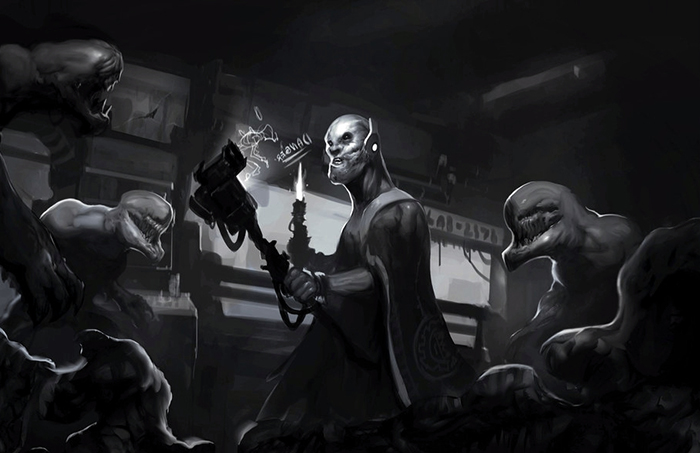
by Eliott Lilly | Aug 17, 2015 | Interviews
David Mitchell is currently a freelance artist, specializing in illustration and conceptual design.
Professional Portfolio: http://applecrow.carbonmade.com/
Support David on Patreon
Education background:
- The Art Institute of Dallas, Dallas, TX
Applied Arts and Computer Animation, 2003-2007
- The Art Institute of Washington, Arlington, VA
Media Arts and Animation, 2002-2003
Shipped Titles / Projects Worked On:
– Teddy Tumble (D7 Games), Burnstar (Nerve Software), Call of Duty: Black Ops 2 (Nerve Software), Aliens: Colonial Marines (Nerve Software)
Current portfolio examples:
In this first part of the interview, we asked David Mitchell specific questions about what it’s like to be a concept artist in the entertainment industry, dispel a few common misconceptions that aspiring artists tend to have about the field, and more. Here’s what he had to say:
HOW OLD WERE YOU WHEN YOU DECIDED TO COMMIT TO BEING AN ARTIST? WHAT WERE YOUR MOTIVATIONS/ INSPIRATIONS?
I was about 18 years old when I found art to be what I wanted to do professionally. It’s always been a hobby, but mostly a sidenote to my love for writing up until that point. My motivation however, really began with reading. I used to collect a lot of pocket paperbacks novels that I could carry around in my bag. They always had such fantastic art on the covers. I would often tear off the covers of the ones I read and carried them around with me. My favorites were the Edgar Rice Burroughs Tarzan and Martian Tales covers, but mainly anything done by Frank Frazetta, or anything that resembled his work that I could find. I’m an avid alien creature space adventure enthusiast when it comes to my reading and my art. Whenever I would write I’d take them out and just look at them from time to time since it gave me inspiration for the stories and characters I wanted to make. After a while I started drawing more than I was writing or reading, and art became something I couldn’t go without for a single day. That’s what led me to go to art school, and from there it has been a constant and increasingly addictive journey in creativity, fun, and thankfully some lucrative experiences and opportunities.
WHAT DO YOU LIKE MOST ABOUT YOUR JOB? WHAT DO YOU FEEL ARE THE BIGGEST CHALLENGES?
Working freelance is a lot of fun, and I love that I have more control over what I create and how I create it. I feel that freedom is what I enjoy most about it. Eventually I look to get into a film studio or another game studio where I can be a part of much larger teams and projects. I prefer working on a team of creative minds to make something more than I can do on my own. That however is among the greater challenges for me as an artist. Struggling with the want to be part of a team all working toward a goal, and the reality of that not always being as free or creative as I’d like. That being said, the challenges of freelance work for me are mainly in time management. Working without many constrictions on projects makes it very easy to go beyond the scope of what you need, making the project or illustration too big and time consuming for its purpose.
ARE THERE ANY MISCONCEPTIONS YOU THINK STUDENTS TEND TO HAVE ABOUT CONCEPT ART AND ILLUSTRATION, THAT YOU WISH TO SET STRAIGHT?
Well, I remember early on thinking that concept art was all about making crazy cool characters and environments all day. That is certainly a part of it, but I had no concept of the nature of what I’d be making most of the time. Concept design is more about creating function and visual language. There’s a lot of repetition and recreation. I would say that is one misconception I’d like to put out there.
It’s not just about making things look pretty. It’s about making things work so that the guy who’s going to model your design can understand what it is.
I’d like to think that with the exposure to so many online workshops and social media bringing artists so close to the industry pros they want to become, that this type of misconception isn’t as common…but you never know.
CAN YOU SHARE A PERSONAL STORY, ABOUT A HARD LESSON THAT YOU LEARNED THAT COULD HAVE BEEN AVOIDED, HAD YOU BEEN BETTER INFORMED?
Probably the hardest lesson I have learned over the last few years is that concept art is mentally very draining, more so than I ever thought it would be. After all, I spent hours on hours drawing all the time when I was in school even more after I got home, and never had an issue.
I didn’t know what mental fatigue really was as an artist. Having to think out and inside of the box all the time and still stay unique and fresh in your designs can wear on you.
For me it was quite depressing, and I hit a point where I just wasn’t creating or thinking on target and it seemed like I couldn’t say on paper what I was saying in my head. The amount of creativity required to do those things day in and day out for months, without any type of relaxation or focus on something unrelated resulted in me getting burned out mentally. I learned the rough way that it was more efficient for me to have other means of focus for my brain every once in a while. Play sports, take dance lesson, lol. Do something to get your brain out of work mode for a time. For me its very much like lifting weights to work out. You don’t want to work out the same muscles non-stop day after day, you’ll hurt yourself. You work them, then you give them a break, and then you work em again.
This concludes Part 1 of our interview with David Mitchell. In Part Two, we discuss with David his Dos and DONTs of portfolio building, how he branded and marketed himself in the beginning, and much more. All images used with permission by the artist. ©David Mitchell



